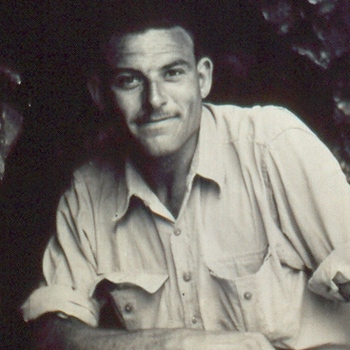DOCTOR OF SCIENCE (HONORIS CAUSA)
 James William Kitching was born at Nieu-Bethesda on 6 February 1922. He attended school there and in Port Elizabeth and received his professional training as a palaeontologist under the world-renowned Professor Robert Broom at the University of the Witwatersrand, where he obtained a doctorate. During the Second World War he served as a member of the South African Defence Force in the Western Desert and in Italy. When the Bernard Price Institute for Palaeontological Research was founded at the University of the Witwatersrand during 1945, James Kitching was appointed its first member of staff. In 1976 he became Deputy Director of this now famous research institute.
James William Kitching was born at Nieu-Bethesda on 6 February 1922. He attended school there and in Port Elizabeth and received his professional training as a palaeontologist under the world-renowned Professor Robert Broom at the University of the Witwatersrand, where he obtained a doctorate. During the Second World War he served as a member of the South African Defence Force in the Western Desert and in Italy. When the Bernard Price Institute for Palaeontological Research was founded at the University of the Witwatersrand during 1945, James Kitching was appointed its first member of staff. In 1976 he became Deputy Director of this now famous research institute.
Kitching’s career as a palaeontologist extends over forty years. In the period from 1945 to 1975 he, amongst other pursuits, studied 6 000 reptile fossils from about 680 sites in the Beaufort beds of the Karroo System. This work led to the reclassification of the Beaufort System into five biozones, and won for him wide international recognition. Some of the most important fossils in this study were found in the vicinity of Graaff-Reinet. This work reveals step by step how mammals evolved from reptiles over a period of millions of years, which conclusion is in itself a tremendous contribution to modern palaeontology. He also made a singular contribution to the discovery of mammalian fossils of the Pleistocene period, and was personally responsible for the first fossil finds of the primitive man of Africa, Australopithecus, at Makapansgat in 1947.
As undoubtedly the most famous fossil expert, he has received invitations from various institutes, universities and palaeontologists throughout the world, but particularly the U.S.A. and the United Kingdom. He has, inter a/ia, at the invitation of the British Museum of Natural History, and the University College of London, led various expeditions to Southern Africa and, at the invitation of the National Science Foundation for Antarctic Research of the U.S.A., to Antarctica, where he found the first complete specimens of Karroo fossils, as well as other forms, which further substantiated the theory of continental drift. He has, on invitation, studied fossils and fossil deposits of the famous Bearemore and McGregor glaciers in Antarctica, and has also made a study of South American fossils corresponding to Karroo forms.
Various awards have been presented to James Kitching during his career, among which the following are the most important:
-
The Certificate of Merit of the South African Association of Science, awarded in recognition of devoted service to the advancement of knowledge in the field of palaeontology.
-
An honorary award from the Museum of Natural History of the Smithsonian Institute, Washington D.C. awarded for meritorious service in recognition and appreciation of valuable services rendered in the scientific pursuits of the Museum of Natural History of the Smithsonian Institute.
He is an elected member of the Royal Society of South Africa and one of the few elected foreign members of the Linnean Society, London. Dr Kitching is also a member of various South African scientific associations. He has published 40 articles in national and international professional journals and is also the author of a scientific textbook. Since 1947 Dr Kitching has been closely involved in the training of students in Zoology and Geology at the University of the Witwatersrand.
JAMES KITCHING was born in the Eastern Cape and is an internationally recognised palaeontologist. For these reasons and in recognition of his research and his status in the South African and the international scientific community as a scientist in the fields of Zoology and Geology in general and Palaeontology In particular, it is a privilege for the Council and the Senate of the University of Port Elizabeth to be able to honour Dr JAMES WILLIAM KITCHING in this way.